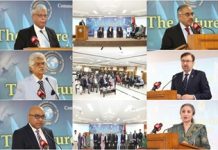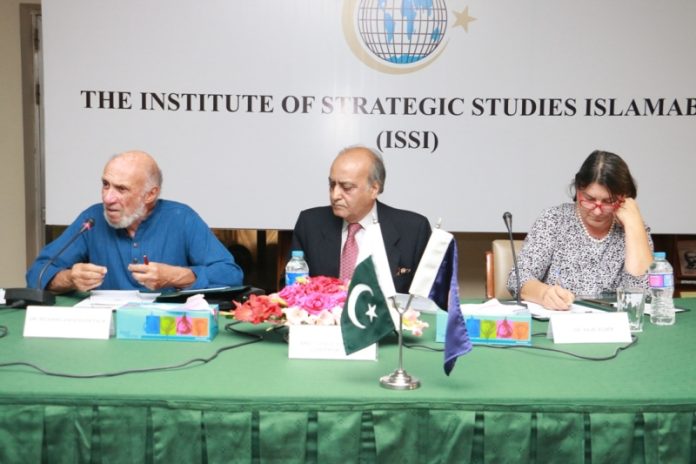Press Release
Public Talk on “Climate Change, Nuclear Disarmament and Humane Global Governance”
Institute of Strategic Studies, Islamabad
August 30, 2016
The Institute of Strategic Studies, Islamabad (ISSI) organized a public talk on “Climate Change, Nuclear Disarmament and Humane Global Governance” on August 30, 2016. The speaker at the occasion was Professor Dr. Richard Anderson Falk, Professor Emeritus of International Law, Princeton University and Former UNHRC Special Rapporteur on Palestine. The talk was part of ISSI’s Distinguished Lecture Series 2016. Dr. Richard was accompanied by his wife Dr. Hilal Elver, who is a Research Professor and global distinguished fellow at the University of California Santa Barbara LA Law School Resnick Food Law and Policy Center.
In his welcome remarks, Chairman Board of Governors ISSI Ambassador Khalid Mahmood said that our climate and ecosystem is under severe stress which is evident from the frequency of natural disasters. Climate change is intimately linked with the disastrous effects of nuclear weapons, and in the 1980s, many studies were made on the effect of climate change due to the use of nuclear weapons and the “nuclear clouds”. In his opinion, these studies underestimated the devastation, as even slightest use of nuclear weapons will devastate our eco-system. In this context, we need a global governance system in order to avert any such scenario where nuclear weapons are used.
Dr. Falk while explaining the topic said that this over-arching subject highlights the short-comings of the international arrangement which cater to the existential threats to humanity. The problems among states are solved in a few basic ways. Firstly, through multilateral consensus among states to serve the humanity. The international system or structure does not have adequate qualities or framework to uphold these global values. The best it could do was what happened in Paris Agreement. The government should take the responsibility of either who generated these problems or who solves them. One of the problematic area of climate change is the degree of the harms which are caused by it, and are concentrated and affecting those communities that are not responsible for generating the problem. He stressed the failure of UN system which emerged after the World War II to provide a plan A approach of solving common challenges to humanity. The gist of the argument by Dr. Falk was to suggest that reliance in this area was not on coercion but on cooperation.
Dr. Hilal during her speech, posed the question on about the difference between human and humane global governance. The fear factor is very important in mobilizing the societies to force their governments, and this fear with regards to nuclear weapons and climate change is one stark distinction. She further explained that the global economy, corporate interest and private sector is less important in nuclear disarmament, but it is a more important factor in climate change scenario. While the concept of security during the Cold War was based on territorial defense, but now it has changed to human security, which is the humane part of global governance and security. The issues are getting more complicated where climate change in more inclusionary and nuclear disarmament is more exclusionary.
The talk was followed by a lively question and answer session which was moderated by Ambassador Khalid Mehmood.
In his concluding remarks Chairman Board of Governors ISSI Ambassador Khalid Mehmood said that the talk underlined the primacy of dangers of nuclear weaponry and climate change as most lethal challenges to international community. This calls for cooperation at international level. But as pointed out by Dr. Falk, the global order is such that it does not bring forth the ideal solution. Therefore, it becomes our duty to bridge this gap and it is the collective responsibility of all to take action in this regard. The Ambassador reiterated Dr. Falk’s point that it is also a differentiated responsibility as small nations do not have resources to confront climate change and that the creation of an organisation like the Green Fund has been created which will provide resources to small countries.
TaimurK/30082016












